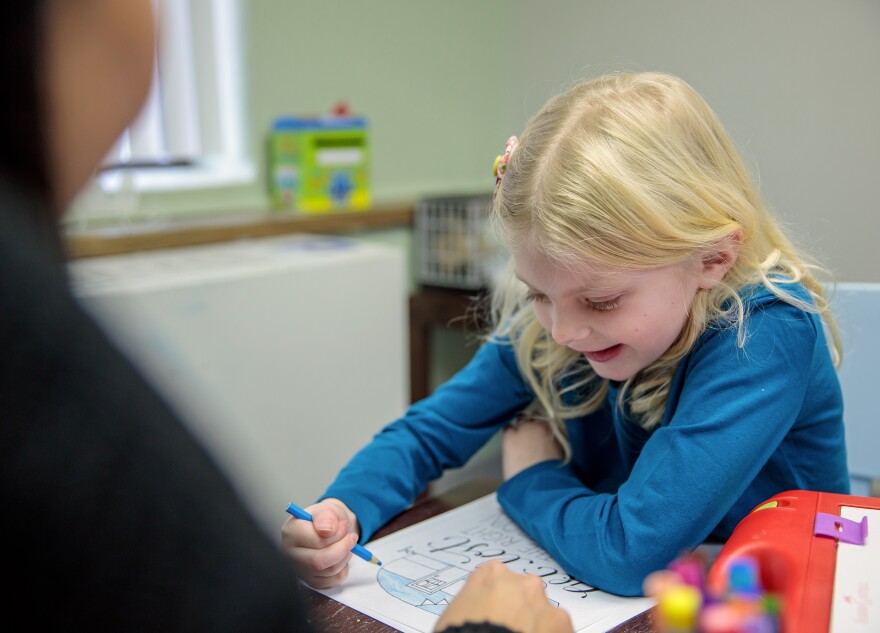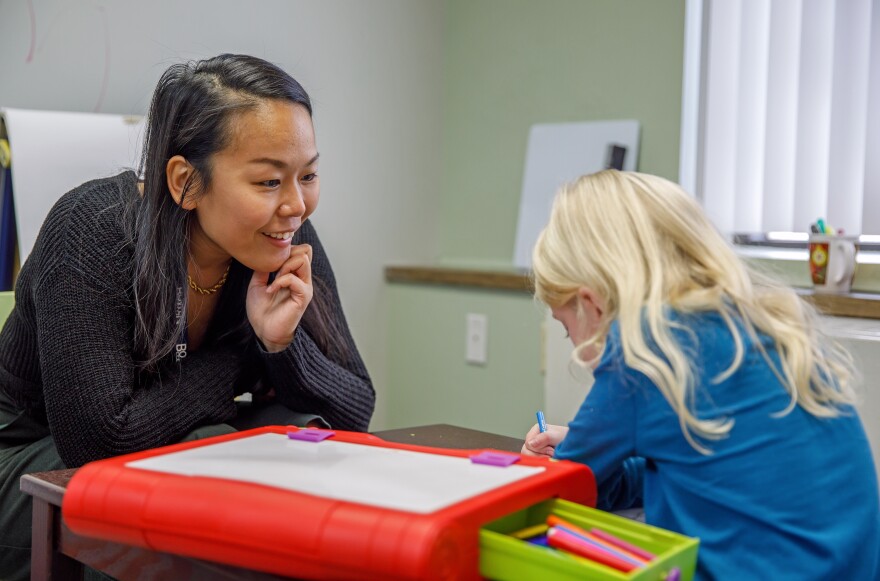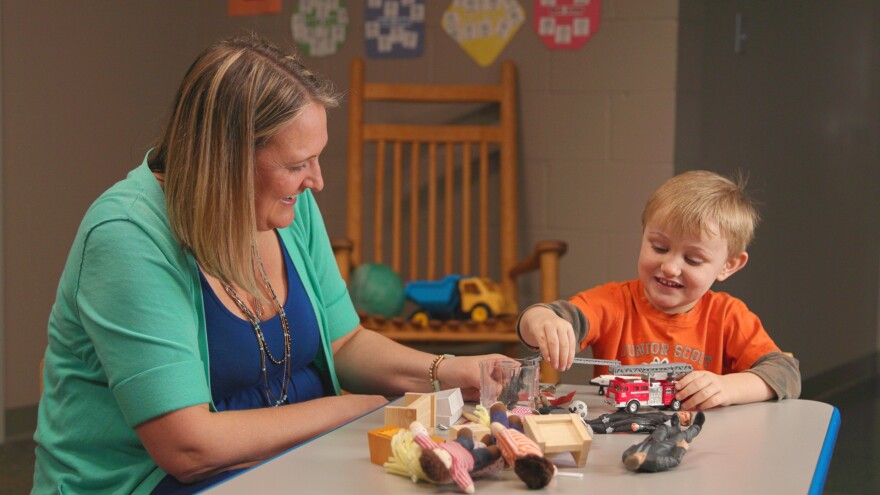Cassandra Smith is a junior at Bishop Dwenger High School in Fort Wayne. She’s on student council, in spirit club, involved in speech and the co-president of the Saints For All Diversity club. But, Smith says, her main interest is theater.
“I’ve been in over 30 local shows and productions,” she said. “Musicals, plays, anything, you name it.”
Smith says she’s been involved in community theater her whole life and is currently an intern at Fort Wayne Youtheatre. But two years ago, that all went away.
In the spring of 2020, COVID-19 reached Allen County and things like community theater and after school programs all began to get canceled. One by one, schools began to make decisions about going remote and cutting students off from their main source of socialization.
Smith says it was a hard adjustment.
“It was like going from doing so much after school, having a constantly packed schedule on weekends and school days, to just having nothing,” she said.
Over the past two years, schools have been remote, tried hybrid systems, required masks and social distancing. Now, most schools are back to being entirely in person. But, how have two years of isolation started to affect students?
Liz Bryan is the director of wellbeing and alternative placement at Fort Wayne Community Schools. She says they’re seeing students’ mental health issues amplify.
“The anxiety is up,” Bryan said. “Our referrals to our mental health partner, Bowen, our student assistance program, those are up.”
And Smith isn’t immune to that fear. She says she’s having a hard time looking forward to plays and concerts she has planned for the spring, knowing that COVID surges could make it all go away again.

“It’s definitely been hard to find motivation to feel excited and happy about things anymore,” Smith said.
Bryan says these mental health issues have been something they look for in students for a while.
“So I wouldn’t say they’re newer,” she said. “I’d say they’re amplified.”
Bryan says suicide ideation is up and, according to the Centers for Disease Control, suicide is the second leading cause of death for Indiana youth.
After two years of the pandemic, Bryan says they can see the changes happening in the behaviors that kids exhibit and bring to schools.
Fort Wayne Community Schools partners with Bowen Center to refer students who might need more support or help than the school guidance counselors can offer. Bowen gives the students three free sessions.
Rebecca Riley is the director of outpatient services at Bowen Center in Allen County. She says she’s also seeing a rise in anxiety and fear with kids.
“A lot of kids are feeling just fearful about everything that’s going on,” she said.
A survey conducted by America’s Promise Alliance in spring of 2020 polled more than 3,000 high school students. It found that 30 percent of young people “say they have more often been feeling unhappy or depressed, and nearly as many say they are much more concerned than usual about having their basic needs met.”
When it comes to younger kids, Riley says, those fears can be harder to explain, let alone help.
“Their brain hasn’t developed in a way where they can really understand, themselves, why they feel the way they feel,” she said. “So, they start acting out.”
Riley says it’s important to remember that when kids are acting out or exhibiting poor behavior, there’s usually a reason for it.
“Kids aren’t bad,” she said. “They are acting out and misbehaving because there’s something wrong or they’re struggling to express themselves.”

For younger kids, Riley says talk therapy can be harder. So, therapists will use something called play therapy instead to try and understand what those kids are feeling or trying to express. During play therapy, the therapist can then help the child to explore their emotions and learn new coping mechanisms.
“Kids really do work out a lot of their feelings and emotions through play,” Riley said.
For older students who get referred to Bowen, those three free sessions can be a place to start to understand what’s bothering them and begin to make a treatment plan. But, Riley says, family support during those three sessions are crucial.
“If it’s just the three sessions, there’s very little that we can do without the family also buying into trying new strategies,” she said.
Fortunately, Riley says, many of the families who get referred to Bowen by FWCS do continue treatment beyond the initial three sessions.
But what about the families who don’t want to continue the sessions or aren’t willing to take the referral in the first place? Smith says at Bishop Dwenger, they’re trying to make things easier on students.
“There are some teachers that have been reaching out, trying to make the workload a little less,” she said.
Smith says they get out early on Thursdays, have longer passing periods and have been reaching out to try to help students who are struggling.
At FWCS, Bryan says they went into this school year knowing that students were going to need extra help. The school system did what Bryan called a “wellness bootcamp” before the beginning of the semester in August.

The bootcamp was to help each school learn some regulation techniques and help students transition back into being in the classroom full time.
“And that has been a huge help for those schools that are truly embracing that and bringing it into their curriculum.”
It wasn’t just about mental wellbeing, though. Bryan says the bootcamp also worked on helping students learn to be students again by working on collaboration, critical thinking and setting expectations for the school year.
“A lot of kids forgot how to do school,” Bryan said. “They forgot how to hit deadlines, they forgot how to study.”
Bryan and Riley both emphasize the importance of parents in seeing and acknowledging their kids’ changing behaviors.
Riley says it’s important to look for a change in how their kids engage with school or if they seem to be isolating themselves or less engaged in play.
Bryan encourages parents to have a set schedule at home because kids need consistency. She says it’s also important to regulate technology and be aware of what their students are doing on social media. She says even before COVID, students were isolating.
“Kids were actually starting to isolate kind of on their own,” Bryan said. “And all due to social media.”
That reliance on social media as a means of connection only got stronger during the pandemic as kids and teens began to rely on it as their only way of connecting with friends and family. Smith says before the pandemic she hated getting a FaceTime call, but now she uses FaceTime to catch up with friends, play games and stay connected.
Bryan encourages parents to find safe ways to get their kids involved and socializing with other children, outside of social media.
Smith says she’s noticed people becoming less comfortable in social situations, leaving sooner than they would have before two years in isolation. But for her, the discomfort comes at the thought that the rug could be pulled out from her at any moment.
Before COVID, Smith says she had a plan for what she wanted her future to look like. Now, it’s hard to make plans without feeling like it could all fall apart. She says she continues to wear a mask out in public and will stay home if she feels sick. But it feels like sacrificing her mental health for her physical wellbeing.

“It’s tough sometimes, because it’s like I want to go to this party, but I know that I shouldn’t because COVID cases are high right now,” Smith said.
So, Smith says, sometimes when the fear begins to rear, she simply has to look around and accept the moment for what it is.
“It’s like, okay, I need to appreciate the things I have right now,” she said. “So, later in life, when I don’t have them maybe, I’ll know that I appreciated them to the fullest.”
That’s one of those self-regulation tactics Bryan and Riley have talked about, finding ways to bring yourself out of that fear and anxiety. Those tactics are easier for teenagers than for children, but none of it is impossible with the proper support system and treatment plan.
Riley says mental health is an important aspect of wellbeing, but that it can often be that last thing that people treat for.
“And it can be very detrimental to somebody’s wellbeing, if left unchecked,” she said.
She says, for parents, it’s just important to watch for those red flags in how their students are engaging with the world and make sure they feel supported and get any help they might need.
The Bowen Center is a financial supporter of WBOI.


